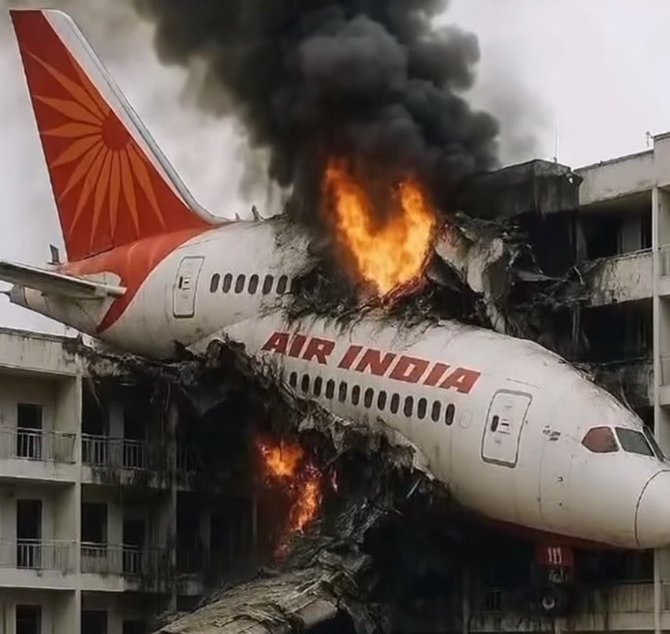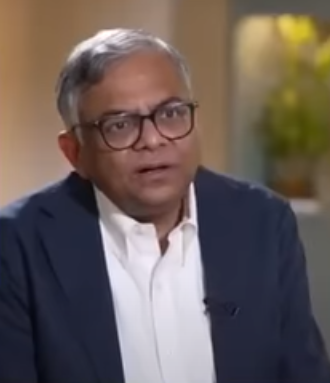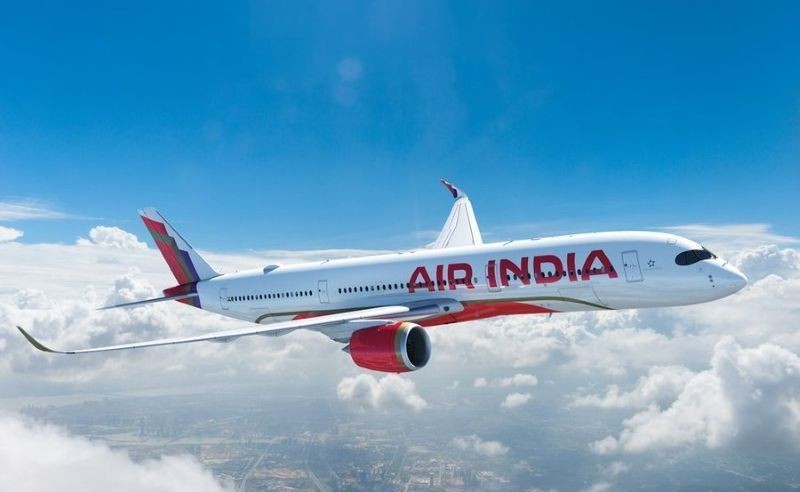
The crash of AI 171 on June 12, 2025, is undeniably one of the worst days in the history of Indian aviation. Out of the 242 people onboard, only one had a miraculous escape, and the plunging aircraft rammed into a medical college hostel, claiming the lives of 33 people on the ground at last count.
Expressing his deep grief and apologising to all the victims, Natarajan Chandrasekaran, Chairman of the Board at Tata Sons, the holding company of Air India (in which Singapore Airlines has a stake of 25.1 per cent), said — in a Times Now interview shared with Connected to India — that his company wanted to “create an AI 171 trust” for the bereaved families, in order to look after their financial requirements and other needs.

In an exclusive interview with Navika Kumar, Group Editor-in-Chief of Times Now and Times Now Navbharat, Chandrasekaran said, “It is an extremely difficult situation where I have no words to express, to console any of the families of those who died. I deeply regret that this accident happened in a Tata-run airline. And I feel very sorry. All we can do is to be with the families at this time, grieve with them and we will do everything to support them at this hour and beyond.”
As to how Tata Sons/Air India planned to support the families of the plane crash victims, the chairman said, “So, there are structures we want to put in place. We wish to create an AI 171 trust, which will be available to them, to look after [the families]. But it is not just about [their] financial needs, but other needs, too. We have to think through and create the trust and other functioning infrastructure so that we can be with these families.”
In his first sit-down interview since the plane crash, N Chandrasekaran took questions from Navika Kumar on a number of aspects related to the crash, ranging from the condition of the engines on the ill-fated aircraft, a Boeing 787 Dreamliner, to the criticism of former Indian civil aviation minister Praful Patel aimed at Singapore Airlines for the latter’s alleged silence on this mishap.
● ‘This aircraft has a clean history’
Asked about the reason for the plane crash and whether Air India was privy to any preliminary findings, Chandrasekaran said that one would have to wait for the probe to be concluded. The Aircraft Accident Investigation Bureau has begun its investigations into the crash, and the Directorate General of Civil Aviation (DGCA) has also appointed a committee. Chandrasekaran said that it could be a month until some of the preliminary findings were revealed.
He claimed in the interview that the aircraft that crashed had a clean history and that no red flags had been raised earlier.
“There are speculations about human error, speculations about airlines, speculations about engines, maintenance, all kinds,” said Chandrasekaran. “There are a lot of speculations and [a] lot of theories. But the fact that I know so far is [that] this particular aircraft… has a clean history.”
As for the engines [of the crashed aircraft], the right engine was a new engine put in March 2025. The left engine was last serviced in 2023 and due for its next maintenance check in December 2025. Both engine histories are clean.
N Chandrasekaran, Chairman of the Board at Tata Sons
● ‘Excellent pilots and great professionals’
About the possibility of human error in the cockpit, Chandrasekaran said, “Both pilots were exceptional. Captain Sabharwal had more than 11,500 hours of flying experience, the first officer Clive (Kundar) had more than 3,400 hours of flying experience. What I hear from colleagues is that they were excellent pilots and great professionals. So, we can’t jump to any conclusions. I am told by all the experts that the black box and recorders will definitely tell the story. So, we just have to wait for that.”
● ‘None of the Dreamliners are maintained by Turkish Technic’
About the show-cause notices issued by the DGCA in the recent past to Air India or fines levied on the airline for delays and operational matters, Chandrasekaran said these were not related to the AI 171 aircraft. “These are different from safety issues. If there is a safety issue, there is no way the DGCA will allow us to fly. And with respect to this specific aircraft, what I have seen is what I have told you.”
The chairman also said that none of the 33 Boeing 787 Dreamliners that were part of the Air India fleet were serviced by Turkish Technic, amidst questions being raised about any Turkish link to the aircraft that crashed. “None of them (the 33 Dreamliners) are maintained by Turkish Technic. Most of them are maintained by AIESL (AI Engineering Services Limited) or SIA Engineering Company (whose parent organisation is Singapore Airlines).”
● ‘Singapore Airlines have helped Air India in many dimensions’
Following the June 12 Air India plane crash in Ahmedabad, former civil aviation minister Praful Patel has questioned the alleged silence of Singapore Airlines, which he said, apart from being a shareholder in Air India, was also responsible for maintaining a significant number of Air India’s wide-body aircraft.
Air India, originally a Tata-run airline, had been operated by the Government of India for many years as the national carrier, before the Tata Group again acquired it in 2022. Following this, the full-service carrier Vistara, jointly owned by the Tata Group and Singapore Airlines, was merged with the re-privatised Air India, and Singapore Airlines took a 25.1 per cent stake in the merged entity in 2024.

Chandrasekaran, in the interview, responded to Patel’s claims, stating, “Singapore Airlines have been a great partner. And since we took over [Air India], they have helped us in many dimensions. Even some of the safety procedures, the best processes, we have taken from Singapore Airlines. We have taken it from Vistara, and [for] many of the processes, where we needed best-in-class benchmarks, they have helped us. They have reached out even at this time; their CEO is in constant touch with me. Whether it is customer experience or any other process, they are always available. They have been offering all the help they can.”
The Tata Sons chief rejected Patel’s claim that Campbell Wilson, the current CEO of Air India, was a Singapore Airlines nominee.
“No, [the] CEO is not a nominee of Singapore Airlines. In fact, when the CEO was hired by me, he had to quit Singapore Airlines and join Air India as an employee. And [at] that time, Singapore Airlines did not have a stake. We owned 100 per cent of Air India. And then, when the Vistara merger happened, with Singapore Airlines, with Air India, then Singapore Airlines got their 25 per cent stake. So he is not a nominee of Singapore Airlines.”
In fact, Chandrasekaran pointed out that 787s had been purchased for the Air India fleet as far back as 2013, almost a decade before the airline was acquired by the Tata Group.
He said, “[Boeing] 787s were also bought by Air India in 2013. And I think Mr Patel was there [in the Union government] at that time. I don’t know when he was the minister. But these are things that happened almost 13 years ago.”
Patel was the Union civil aviation minister between 2004 and 2011, after which he was appointed minister for heavy industries and public enterprises until 2014.
● ‘Overall, 787s have been flying for a very long time’
In the interview, Chandrasekaran was asked about whistleblowers who had spoken out against Boeing, specifically in the context of the manufacturing processes associated with the production of the 787 Dreamliner.
These are things that are being dealt with by investigative agencies in the United States, but overall, 787s have been flying for a very long time…We already had 27 [Boeing] 787s by the time we bought Air India.
N Chandrasekaran, Chairman of the Board at Tata Sons
Since the June 12 tragedy, several Air India flights have been cancelled or faced delays, raising serious concerns among passengers. Chandrasekaran acknowledged that Air India needed to do a better job of communicating with passengers about these matters.
He said, “There are more than 1,100 flights that we fly every day. And in the past six days [since June 12], there have been, in general, anywhere from 5 to 16 or 18 flights, depending on the day, that have been cancelled.
“What has happened in this period of six days [is that] there are three things at work. The first thing is: we have had to go through the DGCA checks. The moment the accident happened on the 12th, the DGCA mandated additional checks to be done on all the 787s. So, we have had to ground many 787s and, as a result, we are short of aircraft and we have to cancel those flights. That is one cause — 24 of the 33 aircraft have gone through checks.
“The second reason is that because of the Iran conflict [with Israel], the airspace there has got closed. Flights, therefore, have had to be diverted. When the flights are diverted, many of the flights get cancelled.
“The third is technical issues. And when we take off and land in any destination, you must know that we will be doing line checks. And every now and then, it is common for the line checks to find some spare part to be changed, for instance. This is not the case on every flight, but it does happen.”
He concluded, “We’ve got to do a better job at communication. We have put a strategic communications team in the past three days.”
● ‘Our focus is on addressing the needs of all those affected’
Chandrasekhar has met with senior officials of Boeing following the tragedy. He said, “So, I did connect with both Boeing and GE at the highest levels. Parallel to the DGCA checks that we have gone through, I have asked them to check and tell us if there have been issues with any of the aircraft or engines.”
In the aftermath of the June 12 crash, the video statement of Air India CEO Campbell Wilson drew plenty of social media criticism, including allegations of plagiarism and a templated response very similar, if not identical, to that of American Airlines CEO Robert Isom, following a crash in Washington DC earlier this year.
Chandrasekaran, in response, said, “Our focus is on addressing the needs of all those affected. But if you look into the spirit of what he said, we should take at this moment the matter that he has conveyed… I have heard about [the templated response]. I have not analysed it word by word, but this is something we will look into.”
● ‘We discussed who should go for the last rites for Captain Sabharwal’
Chandrasekhar also responded to criticism over the absence of Air India officials at the funerals of the 12 crew members who died in the Ahmedabad plane crash. “That is not true. We discussed it at length on the day before and who should go for the [last] rites for Captain Sabharwal,” said the chairman.
“The chief operating officer of Air India was there, the CHR was there and a few more people were there at different levels,” he added. “And we as a group will do multiple things. It is not about just being visible in one location. There will be a senior person who will be there in all the locations, whether it is our crew member or non-crew member. That is why we have created this whole organisation.”
“Some will be in Mumbai, some will be in Gujarat, some will be in other parts of India. I don’t want to say it for any publicity, but we will definitely visit all the families. All the top people will visit all the families,” said Chandrasekhar.


